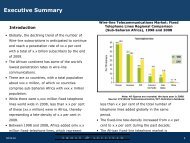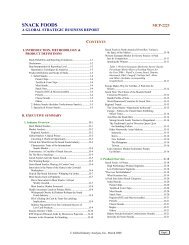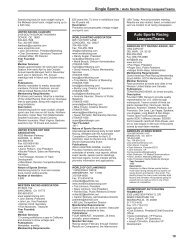the RUSSIA oil & gas competitive intelligence report - Report Buyer
the RUSSIA oil & gas competitive intelligence report - Report Buyer
the RUSSIA oil & gas competitive intelligence report - Report Buyer
Create successful ePaper yourself
Turn your PDF publications into a flip-book with our unique Google optimized e-Paper software.
Russia Oil and Gas Competitive Intelligence <strong>Report</strong> 2010<br />
Overview/State Role<br />
The <strong>oil</strong> sector is concentrated in <strong>the</strong> hands of several domestic companies, with limited direct IOC<br />
involvement. The biggest crude producers, exporters and refiners are state-run Rosneft and Gazprom<br />
Neft, plus privately owned Luk<strong>oil</strong>, Surgutneftegaz, TNK-BP and Tatneft. Following US major<br />
ConocoPhillips’ divestment of its 20% stake in Luk<strong>oil</strong> in 2010, BP is <strong>the</strong> only foreign palyer with a large<br />
interest in Russian <strong>oil</strong> producers through <strong>the</strong> TNK-BP JV. The <strong>oil</strong> pipeline system is managed by staterun<br />
Transneft, <strong>the</strong> <strong>gas</strong> trunklines by Gazprom. Foreign upstream <strong>oil</strong> ventures traditionally have been<br />
carried out through <strong>the</strong> Zarubezhneft state vehicle, although <strong>the</strong> main Russian producers are increasingly<br />
venturing abroad directly.<br />
Gas activities are controlled by national giant Gazprom, which dominates production and holds a<br />
monopoly on exports and, in practice, distribution. Restructuring has been discussed for years with little<br />
progress, although domestic <strong>gas</strong> prices are being very gradually adjusted to international levels, a process<br />
that started in <strong>the</strong> mid 2000s. There were plans to merge Gazprom with Rosneft, but <strong>the</strong> deal was<br />
abandoned.<br />
Licensing And Regulation<br />
There are three proposed changes to Russia's tax structure. First, from <strong>the</strong> beginning of 2011, Russia<br />
intends to increase <strong>the</strong> mineral extraction tax (MET) for both <strong>oil</strong> and <strong>gas</strong> production, with <strong>the</strong> increase in<br />
<strong>the</strong> <strong>gas</strong> MET having been set at 61%. The MET rate is currently RUB419/tonne, adjusted according to <strong>the</strong><br />
price of Urals crude, <strong>the</strong> field depletion rate, and <strong>the</strong> US$/RUB exchange rate. The proposed MET<br />
increases will be inflation-adjusted. Second, Russia has proposed increasing <strong>the</strong> tax on refined products<br />
exports, by an amount equivalent to 60% of <strong>the</strong> crude export duty. The third and final measure being<br />
considered is an increase in <strong>the</strong> <strong>gas</strong>oline excise tax by RUB1 per litre over <strong>the</strong> period 2011-2013.<br />
On December 1 2009, <strong>the</strong> Kremlin scrapped export duty on 13 main East Siberian projects and all<br />
projects in <strong>the</strong> Black and Okhotsk seas. Rosneft said in November 2009 that it expects <strong>the</strong> tax holiday for<br />
East Siberian fields, which includes Vankor, Verknechonsk and Talakan, to last until 2013-2015, bringing<br />
significant savings to <strong>the</strong> industry. The government currently plans to end <strong>the</strong> duty in 2011. Meanwhile,<br />
<strong>the</strong> tax exemptions for Black Sea production have been granted for up to 15 years or until 20mn tonnes<br />
(146.7mn bbl) of <strong>oil</strong> have been produced, while tax exemptions for producers in <strong>the</strong> Sea of Okhotsk in <strong>the</strong><br />
Far East would be granted for up to 15 years or until 30mn tonnes (220mn bbl) of <strong>oil</strong> have been produced.<br />
The <strong>oil</strong> export duty for fields elsewhere in Russia increased by 17% in December 2009 to US$271/tonne,<br />
equivalent to US$37.10/bbl.<br />
According to anonymous government and industry sources cited by Vedomosti in March 2010, <strong>the</strong> export<br />
duty holiday on <strong>the</strong> main East Siberian <strong>oil</strong> fields will remain in place in 2010 but may be revoked in 2011.<br />
According to Vedomosti's sources, <strong>the</strong> re-introduction of export duties on East Siberian crude would cost<br />
<strong>the</strong> major producers in <strong>the</strong> region, namely Rosneft, Surgutneftegaz and TNK-BP, over US$2bn in total.<br />
© Business Monitor International Ltd Page 7









